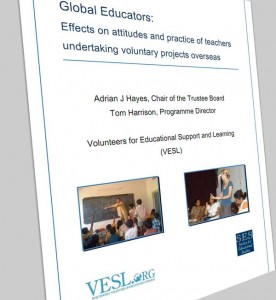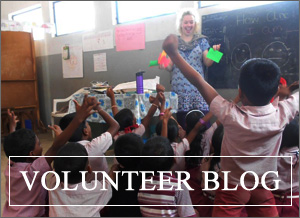The Society of Educational Studies (SES) funded VESL to undertake a research project looking at the effects on attitudes and practice of teachers undertaking voluntary projects overseas.
‘Global Educators’
Report Summary
Schools and teachers are increasingly being asked to use a global outlook in the classroom, and to appreciate the issues of identities and diversity within a culturally cohesive context.
In the last few years there has been a rise in initiatives which enable teachers to learn from visits to schools in other countries. Many of these projects are run by charities who recruit volunteers to take part in these projects; a good example would be VESL’s Teacher Workshop Programme in which qualified UK based teachers spend two weeks running a series of workshops with local Thai Teachers as part of an education forum and exchange of ideas.
There is a small amount of previous research on the benefits of volunteering overseas in the field of education. This shows considerable personal and professional development, with the development of several key skills for working as a teacher. However, these studies have concentrated on long-term projects of over one years’ duration.
Methodology
Interviews were carried out with eleven people who had undertaken short-term educational volunteer projects overseas during or after the completion of formal teaching qualifications. The interviews took between 30 and 60 minutes and were semi-structured. Interviews were recorded and transcribed, and thematically analysed using a constant comparative approach.
Outcome
The report found that there was a great variety of personal and professional benefits experienced by volunteer teachers as a result of their project. Their confidence had greatly improved as a result of coping with difficult situations under adverse conditions. They obtained experience of management and leadership which may not have been available to them at home. Many of the teachers brought back a practiced flexibility to the needs of the class, the ability to teach with few resources, and a willingness to use interactive activities to engage students without feeling they had lost control of the lesson. The projects re-awakened a love of teaching amongst some volunteers, and spurred many to change their professional circumstances.
Global awareness had in some cases been stimulated within the volunteers, who had a renewed sense of appreciation of their own situation and a keen desire to share this with their students. They also had a greater understanding of the challenges faced by students who had English as an additional language having been in a comparable situation themselves. There is scope for future work in encouraging volunteers to set up more formal links between international schools in the spirit of true global partnership.
Conclusion
“The children are fascinated when you come back and are able to put photographs of you up on the board, talk about what’s different and see the realities of what life can be like for children in other parts of the world… they really enjoy learning about what’s going on in different countries. They are fascinated by it whether it’s from the food or looking at the clothes or listening the music. They love anything that is different to what they are used to” [Estelle]




Comments are closed.